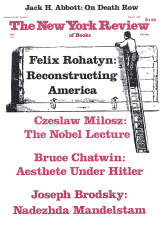In response to:
The Myth of Missile Accuracy from the November 20, 1980 issue
To the Editors:
The Cockburn brothers, in their article “The Myth of Missile Accuracy” [NYR, November 20], substantially distorted what I had told them. I most certainly did not say that acknowledging the accuracy of missiles was “the greatest single mistake of the Carter administration’s defense policy.” What I did say and what I repeated to them with great care was that the Soviet Union would have to make a series of extremely difficult assumptions in order to decide to launch a first strike against United States land-based missiles. The question of accuracy of missiles was a very small part of one of these assumptions.
Leslie H. Gelb
Carnegie Endowment for International Peace
Washington, DC
Andrew Cockburn and Alexander Cockburn replies:
We discussed with Mr. Gelb a variety of factors in the presumed vulnerability of US land-based missiles to a Soviet first strike. These factors included accuracy, reliability of missile systems and more general strategic considerations. Mr. Gelb was of the opinion that since a high degree of assured systems reliability is necessary for a successful preemptive first strike the Soviets would not contemplate such an endeavor. He also thought that the problem posed by “fratricide” would preclude a successful first strike. He also stressed as a factor the inaccuracies that would be caused by gravitational and wind factors—bias. Since we were addressing him mainly on the matter of accuracy it was our assumption that his reference to the “greatest single mistake” concerned more this factor than the wider premises of vulnerability.
It is his right to correct our impression. However we are at a loss to understand his charge that we “substantially distorted” his views, since his criticisms of silo vulnerability assumptions appear to coincide with our own.
This Issue
March 5, 1981



